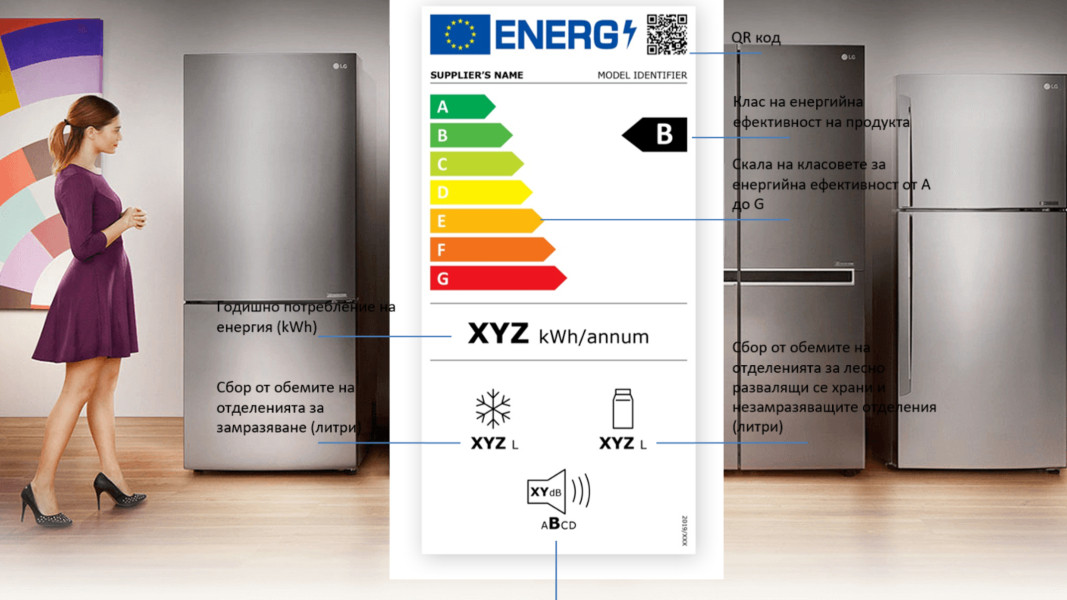If you bought a fridge, a washing machine or a TV set after November 1, 2020, you were perhaps surprised when you unpacked your new electric appliance. You may have found an energy label that differs significantly from the one on the packaging. Well, there is nothing to worry about- the European Consumer Organization (BEUC) notes and explains that this is a step towards the introduction of better labels on the electrical appliances.
Following the EU Regulation 1369 adopted in 2017, the European Commission was tasked with adopting acts on the labeling or conversion of the labeling scale for product groups which have significant potential for savings of energy and in some cases of other resources. According to forecasts, in 2030 these transformations are expected to deliver annual final energy savings of over 260 TWh.
“Over the years, energy labeling legislation has contributed to an exceptional increase in energy efficiency of electrical appliances and energy savings. Household appliances are among the most heavily regulated appliances in terms of energy efficiency”- said Gebriela Chiflichka, General Secretary of APPLiA Bulgaria. The association is part of APPLiA, Home Appliance Europe- a Brussels-based trade association that provides a single, consensual voice for the home appliance industry in Europe. It has a network of 27 National Associations across 25 countries.
The European legislation in the field of labeling is not static, although it has nearly 30 year-long history. The EU Energy Labeling Framework Regulation was updated and adopted three years ago (Regulation (EU) 2017/1369) and will reintroduce a simpler classification, using only the letters from A to G.
The first set of energy labels for refrigerators, washing machines, dishwashers and combo washer dryers will be visible in shops as of March 1, 2021. Labels for television sets and lighting will be also rescaled. The rest of the appliances will receive new energy labels in the coming years, when the necessary legislation is adopted, Gabriela Chiflichka explains.

The rescaling will also lead to a better differentiation among products that, under the current label classification, all appear in the same top categories. It means that an electrical appliance that currently has the A+++ label could become a C category, even though it is just as energy efficient as before, or an electric home appliance that currently has the A++ label could become an E category. The main principle is that the A category will be empty at first, and B and C category are scarcely populated, to pave way for new, more energy efficient products to be invented and developed in the future.
In other words, the new energy labels must achieve two goals- to give consumers clearer parameters that would help them choose new electrical appliance, meanwhile leaving the door wide open for innovations in the sector:
“Manufacturers have not stopped innovating. An energy efficiency of over 80% has been achieved over the years. We strive to introduce new technologies, which is the purpose of the new legislation in this field- to create preconditions for the development of more energy efficient technologies that would lead to greater energy savings in homes.”
Photos: https://ec.europa.eu
English version: Kostadin Atanasov
Since the beginning of the current year, Bulgaria has experienced record heat waves, a series of devastating fires, and a new disaster just days ago – catastrophic floods that claimed human lives . Climate change already has its price – and it is..
Bulgaria will receive EUR 7.4 million in aid from the European Commission to support farmers affected by adverse production conditions in recent months, European Commissioner for Agriculture and Food Christophe Hansen told BTA and clarified that the..
In its "Economic Freedom of the World, 2025" ranking , the Canadian Fraser Institute gives Bulgaria a score of 7.13 out of a maximum of 10 points. This places the country 56th out of 165. It ranks between Greece and Thailand. In 2024, Bulgaria was 52nd..

+359 2 9336 661
